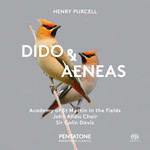|
Back
04/27/2016
Henry Purcell: Dido and Aeneas
Josephine Veasey (Dido), Helen Donath (Belinda), Delia Wallis (Second Woman/First Witch), Elizabeth Bainbridge (Sorceress), Gillian Knight (Second Witch), Thomas Allen (Spirit), John Shirley-Quirk (Aeneas), Frank Patterson (First Sailor), John Alldis Choir, Academy of St. Martin in the Fields, Sir Colin Davis (Conductor)
Recorded at the Walthamstow Town Hall, London, United Kingdom (August 1970) – 58’20
Pentatone PTC 5186 230 – Hybrid Super Audio Compact Disc with essays and libretto in English and German

   
One of the beautiful things about technology is its ability to magically make old recordings sound new again. Oftentimes there is an embarrassing necessity to this, for example, when a state of the art recording must be remastered for a new medium again and again. Just think of all the legendary recordings from the 50s and 60s that were repeatedly attempted on Compacts Disc in the 80s and 90s with unsatisfactory results. The good news is remasterings are typically better than ever and, in the case of these Pentatone Remastered Classics, the home audio technology has finally caught up with the vision of the producers of these classic quadrophonic recordings.
Here, we have a 1970 recording of Purcell’s potent Dido and Aeneas led by Sir Colin Davis. An opera of exceptional brevity and impact, Dido is well-served by these forces. This is indeed a “classic” recording of this piece and, at nearly 50 years-old, it is striking how well manicured the performance is. While “HIP” in performance practice (orchestra and continuo are delightfully nimble), it is often restrained dramatically. More recent performances will take more improvisational liberties, not only musically, but with vocal characterizations, notably the Sorceress and Witches. The singers here prize vocal production (glorious as it is) above dramatic characterization of the music, particularly in the supporting cast.
Led by Josephine Veasey as the ill-fated queen of Carthage, they are suitably virtuosic, navigating Purcell’s melismas and flourishes with acuity. Belinda, strongly sung by Helen Donath, and the Second Woman tend to provide little stylistic contrast to Veasey. There is certainly a different weight to the voices, but extremes are avoided overall, as in “Haste, haste to town.” Likewise the witches, with a foreboding Elizabeth Bainbridge as the Sorceress, clearly take delight in their antics but as the mirror image of the three women protagonists, they are more polite than snarling. John Shirley-Quirk sings a virile Aeneas and Thomas Allen is a neat addition in the small role of the Spirit.
Sir Colin Davis heads the forces with evenness. Tempos are moderate all around and the orchestra plays crisply. The fantastic John Alldis Choir sings the lengthy chorus part with a robust sound, but are dynamic. The final chorus is breathtakingly direct.
The recording is lovingly reproduced in this remastering. The voices and orchestra are given a lot of headroom in this recording with a good deal of echo and sound from the hall. The quadraphonic sound is lush in surround sound with the rear channels being used almost exclusively for ambient sound save a lovely use of them though during the echoing chorus “In our deep vaulted cell.”
While vocally impeccable, in more recent performances of this piece, there is a tendency to play the characterizations up as points of dramatic contrast within the love story, providing a more dynamic and entertaining reading. And this is not to say that this performance approaches being boring. But there is a certain “proper” sound to the entire approach which still manages to work, and given the age of this recording, was cutting edge at the time. This approach is still invaluable historically and obviously valid as an interpretation of this beautiful work. Thanks in part to this fantastic remastering, it remains effective.
Matthew Richard Martinez
|